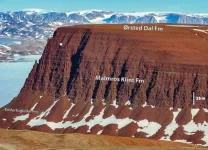INFORMATION:
The paper, 'Managing COVID-19 transmission risks in bars: an interview and observation study', also involved Dr Isabelle Uny, Ashley Brown, Douglas Eadie, Dr Allison Ford, and Martine Stead (all of the
ISMH at the University of Stirling), and Professor Jim Lewsey, of the Institute of Health and Wellbeing at the University of Glasgow.
Study questions whether pubs can effectively prevent COVID-19 transmission risk
2021-02-16
(Press-News.org) A new first-of-its-kind study has questioned whether pub operators can effectively and consistently prevent COVID-19 transmission - after researchers observed risks arising in licensed premises last summer.
Led by the University of Stirling, the research was conducted in May to August last year in a wide range of licensed premises which re-opened after a nationwide lockdown, and were operating under detailed guidance from government intended to reduce transmission risks.
While observed venues had made physical and operational modifications on re-opening, researchers found that practices were variable and a number of incidents of greater concern were observed - these included close physical interaction between customers and with staff, which frequently involved alcohol intoxication and were rarely effectively stopped by staff.
The new study - published in the Journal of Studies on Alcohol and Drugs - is the first in the world to examine the operation of COVID-19 measures in licensed premises and its findings will inform governments, public health experts, and policymakers in the UK and other countries as they consider the impact of the pandemic on hospitality and the risks of lifting restrictions.
Professor Niamh Fitzgerald, Director of the University of Stirling's Institute for Social Marketing and Health, led the research, which was funded by the Scottish Government Chief Scientist Office.
Professor Fitzgerald said: "Our study explored and observed business practices and behaviours of customers and staff in licensed premises in summer 2020 with a view to understanding if and how COVID-19 transmission risks could be managed in settings where alcohol is served. We interviewed business owners and representatives prior to re-opening to understand the challenges being faced. When pubs reopened last July, following the initial UK lockdown, our team visited premises to observe how government measures designed to reduce transmission risks in hospitality settings were working in practice, including any incidents likely to increase those risks.
"Businesses expressed an intention to work within the guidance, but there were commercial and practical challenges to making this a reality. Upon re-opening, substantial efforts to change the layout of bars were observed and appeared to be working well in many premises, but problems were common including staff not wearing personal protective equipment, or with the management of toilets, queues and other 'pinch points'. We also observed several incidents of greater concern -including customers shouting, embracing or repeatedly interacting closely with several households and staff - which were rarely addressed by staff.
"We concluded that, despite the efforts of bar operators and guidance from government, potentially significant risks of COVID-19 transmission persisted in at least a substantial minority of observed bars, especially when customers were intoxicated. Closures of premises can eliminate these risks, but also cause significant hardship for business owners and staff."
The UK entered national lockdown on March 20 last year. In Scotland, licensed premises were permitted to reopen indoor spaces from July 15, with strict safety rules in place to minimise the risk
of transmission. Premises operating to a one-metre physical distancing limit had to install appropriate signage, all customers had to be seated, staff had to wear face coverings, and improved ventilation and noise reduction measures had to be introduced. Following a large outbreak in early August linked to licensed premises in Aberdeen, it was made a legal requirement for customer details to be collected for contact tracing, and guidance was strengthened around queuing, standing and table service.
Interviews
Prior to the restrictions being lifted, the research team conducted interviews with stakeholders - including representatives from major relevant Scottish and UK trade associations - to gauge the sector's thoughts and feelings around implementing COVID-19 measures in licensed premises.
While businesses expressed a willingness to work within government guidance to protect customers and staff, support consumer confidence and enable a return to trading, the interviews - conducted in May and June - also identified commercial challenges of doing so, including financial implications and a risk of compromising the customer experience.
Interviewees felt that there were factors that would help moderate transmission risks, including existing legal requirements on premises (for example, prohibition on selling to drunk customers); industry expertise in managing customer behaviour, including drunkenness; new norms such as allowing table service only; and public anxiety around COVID-19 generally leading to more responsible behaviours. They acknowledged that staff would need to be trained and skilled in implementing the new measures - but also felt that some customers may not appreciate, or respond to, intervention.
Licensed premises observations
Twenty-nine observations of licensed premises took place in July and August, with the researchers monitoring premises for up to two hours while posing as customers. The study found that:
Venues had introduced new layouts, signage, queuing systems, noise and toilet management, and provided hand sanitising stations - however, stations were infrequently used. Two of the venues routinely administered sanitiser to customers' hands on entry.
Most venues required customers to provide contact details to support contact tracing, however, nine businesses observed did not - including one venue visited after this was made mandatory by the Scottish Government in August.
While staff wore personal protective equipment (PPE) in most venues, in several, staff wore no PPE, wore masks inappropriately, or removed them to talk to other staff or customers.
Most venues distanced their tables by one metre or more, or had installed partitions between booths, however, several had tables closer together than that without partitions.
One-way systems were implemented to help regulate the flow of customers - although this measure was sometimes ignored - and pinch points were problematic in nearly all venues, with entrances, corridors, doorways or bar counter areas leading to bottlenecks and people congregating, often unchallenged. Fewer than half of venues offered table service only - which helps avoid any possibility of queuing for service at the bar - and, in at least one venue observed in July, a continuous queue formed in the one-metre space between tables.
Fewer than half of venues had a basic system (for example, a sign on a door) in place to limit the number of customers entering toilets - while most had no measures to ensure physical distancing inside those areas, with no cubicles or sinks condemned. Overcrowding and poor physical distancing was observed to be a problem within toilet areas in some premises.
Incidents
A wide range of incidents with potential to increase transmission risk were observed in all but three venues, with multiple incidents reported in most. Incidents deemed to be of greater concern - due to the repeated or continuous nature of the potential risk, the large number of customers involved, or the involvement of staff - were observed in eleven venues. These included: various combinations of singing, shouting or playing music; mixing between groups; standing and moving around the bar without distancing; customers taking photographs with other customers and staff; shaking hands or embracing others who did not appear to be in their household. Notably, in all but one of the venues visited in August, customers were witnessed singing loudly or shouting, and with just one example of effective staff intervention to suppress customer noise.
The research team identified factors which interacted to give rise to the more serious incidents, including: physical set up and operation of premises, a social atmosphere, customer behaviour, alcohol consumption and staff practices. All but one of these incidents were observed in the evening; all but two occurred in premises located in a town or village, rather than a city; all but three allowed bar service (rather than table service only); and customers often appeared to be regulars.
In the majority of premises, no staff intervention in incidents or attempts to enforce restrictions were observed. In some cases, staff intervened in a light-hearted way - for example, by gently or playfully reprimanding customers - but such interventions were largely ineffective. Enforcement by external agencies - such as environmental health or police officers - was not observed in any of the venues.
The research report notes that Scottish Government guidance does not go into detail on exactly how bar or security staff might be expected to effectively and safely intervene in customer breaches of distancing, or in the management of situations which would normally require close contact between customers and staff - such as the removal of very drunk or belligerent customers from the premises.
Evidence
Professor Fitzgerald said: "Our study makes a unique contribution by providing the first evidence, including direct observation data, of how premises operated in practice when allowed to reopen during the COVID-19 pandemic. Overall, our findings suggest grounds for uncertainty about the extent to which new rules can be consistently and effectively implemented in a sector where interaction between tables, households and strangers is the norm, and alcohol is routinely consumed.
"Despite the efforts of licensed premises, and detailed guidance from Government, potentially significant risks of COVID-19 transmission persisted in a substantial minority of observed bars - especially when customers were intoxicated. Blanket closures, curfews or alcohol sales bans are more likely to be deemed necessary to control virus spread, if such risks cannot be acceptably, quickly and cost-effectively reduced through support and/or sanctions for premises operators. Such blanket actions may also have benefits in terms of protecting staff from occupational exposure and reducing pressure on emergency services from alcohol-related injuries or disorder. However, attention also needs to be paid to the impact of closures on businesses, economic activity, employee hardship, and ownership patterns in the sector, as well as any risks posed by diversion of some drinking to the home."
ELSE PRESS RELEASES FROM THIS DATE:
Large-scale study finds genetic testing technology falsely detects very rare variants
2021-02-16
A technology that is widely used by commercial genetic testing companies is "extremely unreliable" in detecting very rare variants, meaning results suggesting individuals carry rare disease-causing genetic variants are usually wrong, according to new research published in the BMJ.
After hearing of cases where women had surgery scheduled after wrongly being told they had very rare genetic variations in the gene BRCA1 that could significantly increase risk of breast cancer, a team at the University of Exeter conducted a large-scale analysis of the technology using data from nearly 50,000 people. They found that the technology wrongly identified ...
Drinking, smoking, and drug use linked to premature heart disease in the young
2021-02-16
Recreational drinking, smoking, and drug use is linked to premature heart disease in young people, particularly younger women, finds research published online in the journal Heart.
Those who regularly use 4 or more substances are 9 times as likely to be affected, the findings indicate.
The numbers of new cases of heart disease (atherosclerotic cardiovascular disease) have been increasing in young adults, but the potential role of recreational substance use isn't entirely clear.
To probe this further, the researchers explored whether the recreational use of tobacco, cannabis, alcohol, and illicit drugs, such as amphetamine and cocaine, might be linked to prematurely and extremely prematurely furred up arteries.
They drew on information supplied ...
Ageism and sexism barring grandmothers from initiatives to save newborn lives in Global South
2021-02-16
Ageism, sexism, and Western ideals of the nuclear family have excluded grandmothers from national and international policy initiatives to save newborn lives in the Global South, suggests an analysis published in the online journal BMJ Global Health.
This is despite published research indicating that they are a valuable and influential resource for children's health and survival in many cultures, the study author points out.
Around three out of 4 newborn deaths in the Global South occur in the first week of life--40% of them on the first day, and most of them at home.
But ...
Zika vaccine candidate shows promise in phase I trial
2021-02-16
Below please find summaries of new articles that will be published in the next issue of Annals of Internal Medicine. The summaries are not intended to substitute for the full articles as a source of information. This information is under strict embargo and by taking it into possession, media representatives are committing to the terms of the embargo not only on their own behalf, but also on behalf of the organization they represent.
1. Zika vaccine candidate shows promise in phase I trial
Abstract: https://www.acpjournals.org/doi/10.7326/M20-5306
Editorial: https://www.acpjournals.org/doi/10.7326/M21-0397
URL goes live when the embargo lifts
The Zika virus candidate, Ad26.ZIKV.001, a replication-incompetent human adenovirus serotype 26 (ad26) vector showed ...
CO2 dip may have helped dinosaurs walk from South America to Greenland
2021-02-15
A new paper refines estimates of when herbivorous dinosaurs must have traversed North America on a northerly trek to reach Greenland, and points out an intriguing climatic phenomenon that may have helped them along the journey.
The study, published today in Proceedings of the National Academy of Sciences, is authored by Dennis Kent, adjunct research scientist at Columbia University's Lamont-Doherty Earth Observatory, and Lars Clemmensen from the University of Copenhagen.
Previous estimates suggested that sauropodomorphs -- a group of long-necked, herbivorous dinosaurs that eventually included Brontosaurus and Brachiosaurus ...
Counterintuitive approach may improve eyewitness identification
2021-02-15
Experts have devised a novel approach to selecting photos for police lineups that helps witnesses identify culprits more reliably.
In a paper published by the Proceedings of the National Academy of Sciences, researchers - from the University of California San Diego and Duke University in the United States and the University of Birmingham in the U.K. - show for the first time that selecting fillers who match a basic description of the suspect but whose faces are less similar, rather than more, leads to better outcomes than traditional approaches in the field.
The counterintuitive technique improves eyewitness performance by about 10 percent.
"In ...
New surgery may enable better control of prosthetic limbs
2021-02-15
CAMBRIDGE, MA -- MIT researchers have invented a new type of amputation surgery that can help amputees to better control their residual muscles and sense where their "phantom limb" is in space. This restored sense of proprioception should translate to better control of prosthetic limbs, as well as a reduction of limb pain, the researchers say.
In most amputations, muscle pairs that control the affected joints, such as elbows or ankles, are severed. However, the MIT team has found that reconnecting these muscle pairs, allowing them to retain their normal push-pull ...
In predicting shallow but dangerous landslides, size matters
2021-02-15
The threat of landslides is again in the news as torrential winter storms in California threaten to undermine fire-scarred hillsides and bring deadly debris flows crashing into homes and inundating roads.
But it doesn't take wildfires to reveal the landslide danger, University of California, Berkeley, researchers say. Aerial surveys using airborne laser mapping -- LiDAR (light detection and ranging) -- can provide very detailed information on the topography and vegetation that allow scientists to identify which landslide-prone areas could give way during an expected rainstorm. This is especially ...
Corn belt farmland has lost a third of its carbon-rich soil
2021-02-15
More than one-third of the Corn Belt in the Midwest - nearly 100 million acres - has completely lost its carbon-rich topsoil, according to University of Massachusetts Amherst research that indicates the U.S. Department of Agricultural has significantly underestimated the true magnitude of farmland erosion.
In a paper published in the Proceedings of the National Academy of Sciences, researchers led by UMass Amherst graduate student Evan Thaler, along with professors Isaac Larsen and Qian Yu in the department of geosciences, developed a method using satellite ...
Spanish scientists uncover early links between cardiovascular risk and brain metabolism
2021-02-15
The links between cardiovascular disease and cognitive impairment begin years before the appearance of the first clinical symptoms of either condition. In a study carried out at the Centro Nacional de Investigaciones Cardiovasculares (CNIC) in partnership with Santander Bank and neuroimaging experts at the Barcelonaβeta Brain Research Center (BBRC, the research center of the Fundación Pasqual Maragall), the investigators have identified a link between brain metabolism, cardiovascular risk, and atherosclerosis during middle age, years before the first appearance of symptoms.
The report, published in the Journal of the American College of Cardiology (JACC), ...




